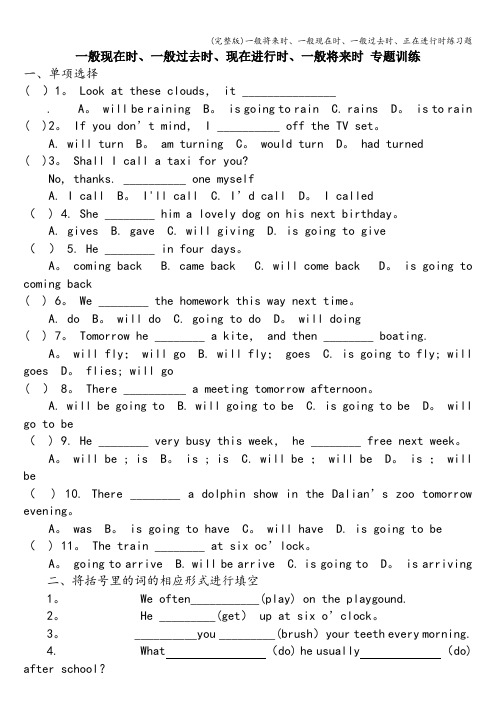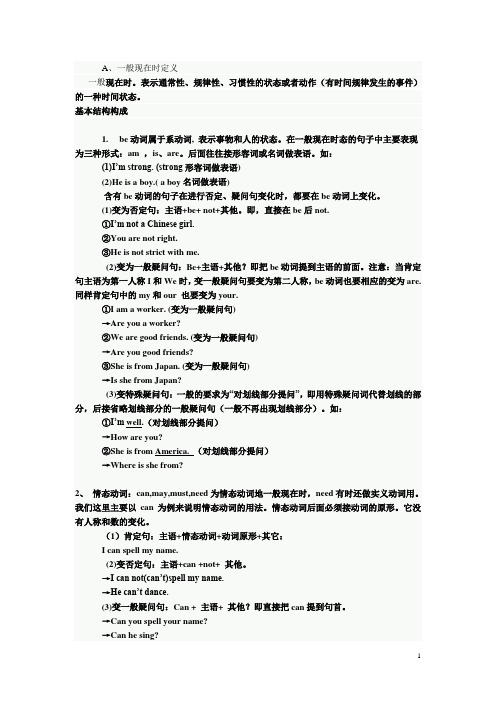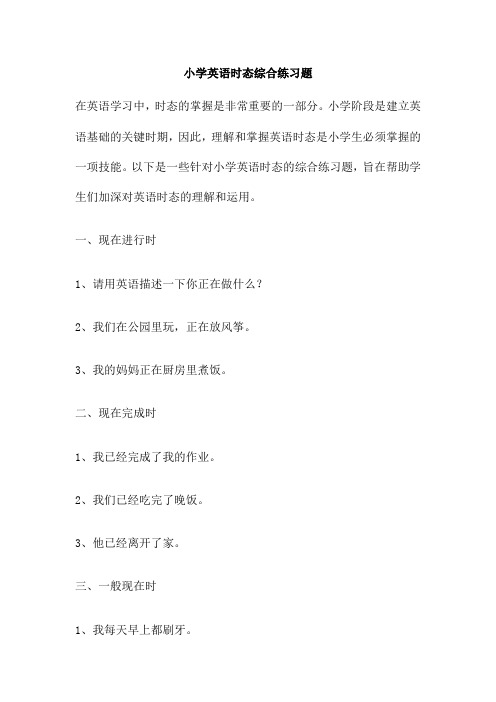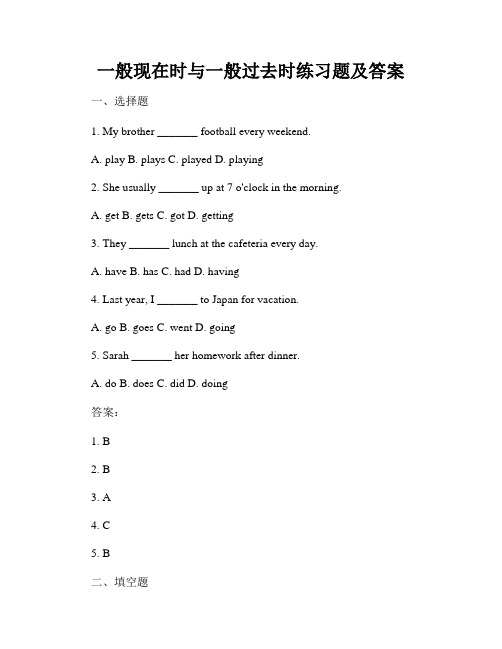一般现在时与一般过去时比较练习
一般现在时和一般过去时专项练习

一般现在时和一般过去时专项练习(小学六下英语)一、用括号中词的适当形式填空。
1.He often (have)dinner at home2.Daniel and Tommy (be) in Class One.3. you (brush) your teeth every morning.4. What ( do) he usually (do) after school?5. What they often (do) on Saturdays?6. She and I (take) a walk together every evening.7. Mike (read) English every day.8. We often (play ) football in the playground.9. You always (do) your homework well.10. How many lessons_ your classmates (have )on Monday?11. We (enjoy ) ourselves at the party last night.12.Jack (study )for the English test last Sunday。
13. you (go) to the great wall last year?14. What day (be) it yesterday?15. What day (be) it today?16. The old man (be) ill and went to see a doctor.17. How (be) the students? They were very friendly.18. They (buy ) a guitar yesterday.19. I listened but (hear) nothing.20. Tom (begin) to learn Chinese last year.21. There ( be) no one here a moment ago.二、改写句子1. Lucy did her homework at home.(改否定句)Lucy her homework at home.2.He found some meat in the fridge(冰箱).(对划线部分提问)he in the fridge?3. There was some orange in the cup.(变一般疑问句)there orange in the cup?4. Frank read an interesting book about history. (一般疑问句)Frank an interesting book about history?5. I was in Canada last year.in Canada last year?三、改错题1. How is Jane yesterday?2. He go to school by bus Last week.3.He often goes home at 6:00 last month.4. I can fly kites seven years ago.5. Did you saw him just now?6. Tomwasn’t watch TV last night.7. I didn't my homework yesterday8. He wait for you three hours ago.9. Who find it just now?10. What did he last week?参考答案:一、用括号中词的适当形式填空。
一般现在时和一般过去时精讲+练习题

一、一般现在时(一)概念:表示经常性或习惯性的动作,或存在的状态1、肯定句:主语+谓语+其他。
She reads English everyday .2、否定句:主语+don’t/doesn’t+谓语+其他。
He doesn’t get up at 6:30 in the morning .3、一般疑问句:Do/Does+主语+V原+其他?Do you like English ? Yes, I do. /No, I don’t .4、特殊疑问句:特殊疑问词+do/does+主语+V原+其他?What time do you get up every morning ?Where does your father work ?(四)具体用法1、表示经常性或习惯性的动作,或存在的状态,常与表示频率的时间状语如:often , sometimes , usually,always , seldom,never, every day /year/month...), once/twice a week (month , year , etc.) , on Sundays等连用。
I leave home for school at seven every morning .2、在以when,if, as soon as, as long as等连词引导的从句中,当主句的谓语动词是一般将来时,那么从句的谓语动词通常用一般现在时来表示将来要发生的动作。
(主将从现)I'll tell him the news when he comes back. 他回来时,我将告诉他这个消息。
If you come this afternoon,we’ll have a meeting.今天下午如果你来,我们就开个会。
3、描述事物的状态、性质、特征等,例如:The door is open. 门是开着的。
The apple is sweet.这个苹果是甜的。
(完整版)一般将来时、一般现在时、一般过去时、正在进行时练习题

一般现在时、一般过去时、现在进行时、一般将来时专题训练一、单项选择( )1。
Look at these clouds, it _______________. A。
will be raining B。
is going to rain C. rains D。
is to rain ( )2。
If you don’t mind, I __________ off the TV set。
A. will turn B。
am turning C。
would turn D。
had turned( )3。
Shall I call a taxi for you?No, thanks. __________ one myselfA. I call B。
I'll call C. I’d call D。
I called() 4. She ________ him a lovely dog on his next birthday。
A. givesB. gaveC. will givingD. is going to give() 5. He ________ in four days。
A。
coming back B. came back C. will come back D。
is going to coming back( ) 6。
We ________ the homework this way next time。
A. do B。
will do C. going to do D。
will doing( ) 7。
Tomorrow he ________ a kite, and then ________ boating.A。
will fly; will go B. will fly; goes C. is going to fly; will goes D。
flies; will go( ) 8。
一般现在时和一般过去时讲解及练习

A、一般现在时定义一般现在时。
表示通常性、规律性、习惯性的状态或者动作(有时间规律发生的事件)的一种时间状态。
基本结构构成1. be动词属于系动词, 表示事物和人的状态。
在一般现在时态的句子中主要表现为三种形式:am ,is、are。
后面往往接形容词或名词做表语。
如:(1)I’m strong. (strong形容词做表语)(2)He is a boy.( a boy名词做表语)含有be动词的句子在进行否定、疑问句变化时,都要在be动词上变化。
(1)变为否定句:主语+be+ not+其他。
即,直接在be后not.①I’m not a Chinese girl.②You are not right.③He is not strict with me.(2)变为一般疑问句:Be+主语+其他?即把be动词提到主语的前面。
注意:当肯定句主语为第一人称I和We时,变一般疑问句要变为第二人称,be动词也要相应的变为are.同样肯定句中的my和our 也要变为your.①I am a worker. (变为一般疑问句)→Are you a worker?②We are good friends. (变为一般疑问句)→Are you good friends?③She is from Japan. (变为一般疑问句)→Is she from Japan?(3)变特殊疑问句:一般的要求为“对划线部分提问”,即用特殊疑问词代替划线的部分,后接省略划线部分的一般疑问句(一般不再出现划线部分)。
如:①I’m well.(对划线部分提问)→How are you?②She is from America. (对划线部分提问)→Where is she from?2、情态动词:can,may,must,need为情态动词地一般现在时,need有时还做实义动词用。
我们这里主要以can为例来说明情态动词的用法。
情态动词后面必须接动词的原形。
小学英语时态综合练习题

小学英语时态综合练习题在英语学习中,时态的掌握是非常重要的一部分。
小学阶段是建立英语基础的关键时期,因此,理解和掌握英语时态是小学生必须掌握的一项技能。
以下是一些针对小学英语时态的综合练习题,旨在帮助学生们加深对英语时态的理解和运用。
一、现在进行时1、请用英语描述一下你正在做什么?2、我们在公园里玩,正在放风筝。
3、我的妈妈正在厨房里煮饭。
二、现在完成时1、我已经完成了我的作业。
2、我们已经吃完了晚饭。
3、他已经离开了家。
三、一般现在时1、我每天早上都刷牙。
2、我们每周都去公园玩。
3、他每天晚上都读书。
四、一般过去时1、昨天我去了电影院。
2、上周我们去了海滩。
3、昨晚她看了电视。
五、一般将来时1、我明天将要完成作业。
2、我们下周将要去看电影。
3、他将在下个月搬到新家。
以上练习题旨在帮助学生理解和掌握基本的英语时态。
对于小学生来说,时态的学习可能相对复杂,但通过反复练习和实际应用,他们可以逐渐掌握并开始在日常生活中运用这些时态。
教师和家长可以鼓励学生多做类似的练习,帮助他们提高英语时态的理解和运用能力。
小学英语时态练习题一、一般现在时1、I eat apples every day. (我每天吃苹果。
)2、He studies hard every day. (他每天努力学习。
)3、They play basketball every week. (他们每周打篮球。
)二、现在进行时1、I am eating apples now. (我现在正在吃苹果。
)2、He is studying hard now. (他现在正在努力学习。
)3、They are playing basketball now. (他们现在正在打篮球。
)三、一般过去时1、I ate apples yesterday. (我昨天吃了苹果。
)2、He studied hard yesterday. (他昨天努力学习了。
)3、They played basketball yesterday. (他们昨天打篮球了。
一般现在时与一般过去时练习题及答案

一般现在时与一般过去时练习题及答案一、选择题1. My brother _______ football every weekend.A. playB. playsC. playedD. playing2. She usually _______ up at 7 o'clock in the morning.A. getB. getsC. gotD. getting3. They _______ lunch at the cafeteria every day.A. haveB. hasC. hadD. having4. Last year, I _______ to Japan for vacation.A. goB. goesC. wentD. going5. Sarah _______ her homework after dinner.A. doB. doesC. didD. doing答案:1. B2. B3. A4. C5. B二、填空题1. They often _______ (watch) movies at the cinema on weekends.2. My father usually _______ (read) the newspaper in the evening.3. Last month, we _______ (travel) to Europe.4. She _______ (not like) coffee, she prefers tea.5. Yesterday, I _______ (meet) my old friend at the park.答案:1. watch2. reads3. traveled4. doesn't like5. met三、改错题1. He go to school by bus every day.改为:He goes to school by bus every day.2. We saw a movie yesterday evening.改为:We see a movie yesterday evening.3. They doesn't like swimming in the pool.改为:They don't like swimming in the pool.4. Last weekend, she went to shopping with her friends.改为:Last weekend, she went shopping with her friends.5. My sister usually cook dinner for the family.改为:My sister usually cooks dinner for the family.答案:1. go → goes2. s aw → see3. doesn't → don't4. to shopping → shopping5. cook → cooks四、句型转换1. He watches TV every evening. (改为否定句)He doesn't watch TV every evening.2. They played soccer yesterday. (改为一般疑问句)Did they play soccer yesterday?3. She goes to the gym twice a week. (对划线部分提问) How often does she go to the gym?4. I usually eat breakfast at 7 o'clock. (改为过去时态)I usually ate breakfast at 7 o'clock.5. The cat sleeps all day. (改为否定句)The cat doesn't sleep all day.答案:1. 否定句:He doesn't watch TV every evening.2. 一般疑问句:Did they play soccer yesterday?3. 对划线部分提问:How often does she go to the gym?4. 过去时态:I usually ate breakfast at 7 o'clock.5. 否定句:The cat doesn't sleep all day.总结:通过这些练习题,我们可以巩固和加深对一般现在时和一般过去时的理解和应用。
一般现在时和一般过去时练习及答案
一般现在时和一般过去时练习及答案一)、单选1 Jenny ____ in an office. Her parents ____in a hospital.A work; worksB works; workC work; are workingD is working; work2 One of the boys_____ a black hat.A haveB there isC there areD has3 We didn't go shopping because it____ yesterday.A don't rain Bdidn't rain Crains Drained4 The sun ____in the east and ____in the west.A rose; setB rises; setsC rises, setD rise; sets5 Wang Mei ____ music and often ____ to music.A like; listenB likes; listensC like; are listeningD liking ; listen6 Jenny____ English last night.A has studyB studiesC studyD studied(二)、填空1 I can take Li Ming there when he __comes___ ( come) to visit.2 _Does____your sister_know____(know)English?3The pot__doesn't___(not look) like yours very much.4Who__wants___(想要 )to go swimming?5 _Does_____she_do____(do) the housework every day?6 Jenny and Danny usually_play_____(play) games in the afternoon .7. I _____had____ (have) an exciting party last weekend.8. __Did_______ she __pratice_______(practice) her guitar yesterday? No, she __didn't_______.9. What _did_______ Tom __do______ (do) on Saturday evening?He ___watched_____(watch) TV and __read________(read) an interesting book.10. They all _went________(go) to the mountains yesterday morning.11. She __didn't visit_______(not visit) her aunt last weekend.三、改写句子:1、Lucy did her homework at home.(改否定句)Lucy __didn't do_________ ___________ her homework at home.2、He found some meat in the fridge(冰箱).(变一般疑问句)__Did_________he ___find___________any_______meat in the fridge?3、She stayed there for a week.(对划线部分提问)___How_______ __long_________ ___did_______ she __stay________ there?4、There was some orange in the cup.(变一般疑问句)___Was______ there _____any______ orange in the cup?5.Her name is Mei Ling.(对划线部分提问)What's her name?6.We go to evening school at night.(改否定句)We don't go to evening school at night.7.My brother works in a radio factory.(变一般疑问句) Does your brother work in a radio factory?8.You have a red pencil.(变一般疑问句) Do you have a red pencil?选择题答案为红色的。
一般现在时和一般过去时练习题
一般现在时和一般过去时练习题一、用所给动词的正确时态填空。
1.He ______ TV every evening. (watch)2.We always _______ t o school on foot. (go)3.Tom, with his classmates, often ____ football after school. (play)4.Their classroom _______ four big windows. (have)5.Your shoes ______ u nder the bed. (be)6.She ____ for her friends at the bus stop now. (wait)7.Sorry, I ______ no enough money with me now. (have)8.The days _____ longer and longer now. (get)9. ____ here and ______ by me. (come, stand)10.Look, the bus ______ . (come)11.His uncle usually ________ to work by bus. (go)12.Sorry, I’m busy. I _____ to a friend of mine in Hangzhou. (write)13.Lin Tao and his classmates _____ on a farm next week. (work)14.We ____ to the Great Wall if it _______ fine tomorrow. (go, be)15.Look at the cloud. I think it _______ . (rain)16.Mary ______ thirteen next year. (be)17.Today is Monday. Tomorrow _____ Tuesday. (be)18.There ______ no hospitals here ten years ago. (be)19.He __ you to the station tomorrow morning. (see)20.It ___ very hard. We’d better stay at home. (rain)21.I always _____ up at six in the morning, but I _____ u p a little later yesterday. (get )22.She _____ swim very well when she was five years old. (can)23.They ______ in Beijing in 1960. (be)24.He always ______ t o work by bike when he was in Shanghai. (go)25.I ____ you up as soon as I _____ to Nanjing. (ring, get)26.They never _______ in the room. (smoke)27.I ____ to school yesterday because I _____ i ll. (not go, be)28.John _______ like his father. (look)29.Be quiet. The baby ____ .(sleep)30.Some young people ______ in the lake. (swim)二、按要求变换句型。
小学英语一般现在时与一般过去时测验
小学英语一般现在时与一般过去时练习一、写出下列动词的第三人称单数和过去式:talk______/_______forget_______/_______hope_______/______stop_______/________play______/_______say_______/_________ buy________/________worry______/_______fly_______/_______ study________/________like_______/________make______/_______ take______/_______love________/_________become_______/_______ come______/_______drive_______/_______shine_______/________ leave______/_______ride______/________write______/_______give______/________see_______/__________swim_______/________ stop_______/_______plan______/________get______/__________sit_______/_______let_______/________cut_______/________run______/__________forget_______/________begin_______/_______ wash_____/________watch_______/_______finish______/________ teach_____/________reach_______/_______go_______/_______do_______/_________三、用括号内动词的适当形式填空:1.Heoften________havedinnerathome.2.DanielandTommy_______beinClassOne.3.We_______notwatchTV onMonday.4.Nick_______notgotothezooonSunday.5.______they________liketheWorldCup6.What_______theyoften_______doonSaturdays7._______yourparents_______readnewspaperseveryday8.Thegirl_______teachusEnglishonSundays.9.SheandI________takeawalktogethereveryevening.10.There________besomewaterinthebottle.11.Mike_______likecooking.12.They_______havethesamehobby.13.Myaunt_______lookafterherbabycarefully.14.Youalways_______doyourhomeworkwell.15.I_______beill.I’mstayinginbed.16.She_______gotoschoolfromMondaytoFriday.17.LiuTao_______donotlikePE.18.Thechildoften_______watchTVintheevening.19.SuHaiandSuYang_______haveeightlessonsthisterm.20.-Whatday_______beittoday-It’sSaturday.选择填空1. There _____ a cat and two birds in the tree just now..A.wereB. hasC. isD. was2. Why _____ you buy some fruitA.notB. not toC. don’tD. don’t to3. Would you like _________ for your breakfastA. any eggsB. any strawberriesC. some breadD. some apples juice4. Do you know the answer ________ the questionA. toB. ofC. atD. in 5. Thank you ________ me.A. for helpB. for helpingC. at helpingD. to help6. I’m going to school ______ Monday morning.A.atB. inC. ofD. on7. ________ would your brother like as a birthday presentA. HowB. WhatC. How manyD. Where1.My father______ill yesterday.A.isn't B.aren't C.wasn't D.weren't2.______your parents at home last week﹖A.Is B.Was C.Are D.Were3.The twins______in Dalian last year.They______here now.A.are; were B.were; are C.was; are D.were; was 4.______your father at work the day_____yesterday前天﹖A.Was; before B.Is; before C.Was; after D.Is; after 5.—Who was on duty last Friday﹖—______.A.I am B.I was C.Yes, I was D.No, I wasn't按照要求改写句子1.Daniel watches TV every evening.改为否定句2.I do my homework every day.改为一般疑问句,并作否定回答likes milk.改为一般疑问句,并作肯定回答3.Amy likes playing computer games.改为一般疑问句,并作否定回答4.We go to school every morning.改为否定句6. He speaks English very well.改为否定句7.I like taking photos in the park.对划线部分提问8.John comes from Canada.对划线部分提问9.Sheisalwaysagoodstudent.改为一般疑问句,作否定回答10.SimonandDaniellike goingskating.改为否定句11.Doyouoftenplayfootballafterschool肯定回答12.Ihavemanybooks.改为否定句五、改错划出错误的地方,并在下面改正1.IsyourbrotherspeakEnglish2.Doeshelikesgoingfishing3.Helikesplaygamesafterclass.4.Mr.WuteachsusEnglish.5.Shedon’tdoherhomeworkonSundays.6.HowisJaneyesterday7.Hegotoschoolbybuslastweek.8.Heoftengoeshomeat6:00lastmonth.9.Icanflykitessevenyearsago.10.Didyousawhimjustnow.11.Tomwasn’twatchTVlastnight.12.Ididn’tmyhomeworkyesterday.13.Hewaitforyouthreehoursago.14.Whofinditjustnow15.Whatdidhelastweek六、单选填空:1._____he________agoodrestNo,hedidn’t.A.Have,hadB.Did,haveC.Did,hadD.Had,had2.When_________Lee________schoolthismorningA.had,gottoB.did,gettoC.did,getD.did,gotto3.______you________atsixo’clockyesterdayA.Do,getupB.Did,getupC.Do,gotupD.Did,gotupdidyousee_________A.nowB.everydayC.since1990D.justnowwentintotheroomand_______thedoor.A.lockB.lockingC.locksD.locked6.—What_____you_______lastweek—Iboughtabag.A.did,buyB.did,boughtC.do,buyD.do,bought7.—_____he____hislunch—Yes,hedid.A.Have,hadB.Had,hasC.Did,haveD.Did,had8.—WhendidMaycomebackfromHongKong—She_____fromHongKonglastFriday.AebackBesbackC.returnedbackD.cameback9.____she_____thisdictionaryinthebookshopnearbylastweekA.Did,buyB.Does,buyC.Did,boughtD.Does,buys10.Where_____UncleSunyesterdayA.wasB.wereC.didD.Does11.He______worriedwhenheheardthenews.A.isB.wasC.doesD.did七、用所给动词的适当形式填空:andMary___________cometoChinalastmonth.notgotobeduntil12o’clocklastnight.SoI_______getuplate.__________readEnglishyesterdaymorning._________benoonehereamomentago.___________callMikethismorning.listenedbut___________hearnothing.7.Tom___________begintolearnChineselastyear.stweekwe_________pickmanyapplesonthefarm.mother________________notdohouseworkyesterday. watchesTVeveryevening.Butshe_______________notwatchTVlastnight. yourfather________gotoworkeverydaylastyear12.—Whattime_______you_______gettoBeijingyesterday—We__________gettoBeijingat9:00intheevening.__________makehimcry哭justnowyeartheteacher___________tellusthattheearthmovesaroundthesun.____________atelephonecallforyoujustnow.be__________notenoughpeopletopickapplesthatday.be_____________anyhospitals医院inmyhometown家乡in1940.benot____________enoughmilkathomelastweek,wasn’tthere____________toJapanlastweek.move20.When_______you_________cometoChina-Lastyear.she________havesupperathome____________notcleantheroomjustnow.beitcoldinyourcityyesterdaymanypeople________bethereinyourclasslastterm________behotyesterdayandmostchildren_______beoutside.26.There________beafootballmatchonTVyesterdayevening,butI_________havenotim etowatchit.27.Heatesomebreadand_________drinksomemilk.28.________he__________finishhishomeworklastnight29.I__________betiredyesterd ay.30.I___________gainArtsdegreelastyear.31.What_________you___________dolastnight32.Mygrandfather_________leaveHongKongforNewYorkin1998.33.What_______he ________stweekI_______buyanewbike.35.He________beherejustn ow.36.He__________notfindhiskeylastnight.37.Myfather__________drinkalotofwineyesterday.38.________you________finishyo urhomeworkyesterday39.I________eatsomeeggsandbreadthismorning.40.Hermother__________notgivethegirlanypresent.八、句型转换:1.Thechildrenhadagoodtimeinthepark.否定句:__________________________________________一般疑问句:________________________________________对划线部分提问:____________________________________2.Therewereaboutninehundredpeopleattheconcert.否定句:__________________________________________一般疑问句:________________________________________对划线部分提问:____________________________________3.Anndidherhomeworkyesterdayevening.否定句:__________________________________________一般疑问句:________________________________________对划线部分提问:____________________________________stweekIreadanEnglishbook.否定句:__________________________________________ 一般疑问句:________________________________________ 肯定/否定回答:____________________________________ 对划线部分提问:____________________________________ 5.Mybrotherwasintheparkjustnow.否定句:__________________________________________ 一般疑问句:________________________________________ 对划线部分提问:____________________________________。
一般现在时,过去时,将来时 练习题解析
一般现在时、一般过去时、一般将来时——练习题答案解析一星题1.go解析:早上七点上班是一件经常做的事,所以是一般现在时。
We是复数,所以用go。
2.read解析:last night是昨晚,是一般过去时的标志词,read的过去式还是read。
3.Swept,didn’t解析:yesterday是一般过去时的标志词,所以用sweep的过去式,是swept,but表示转折,意味着我拖地板了但是妈妈没有,所以第二空填表示否定的,只有一个空,所以用助动词,didn’t。
4.Did,do,did解析:just now解释为刚才,是一般过去时标志词,所以是did,do,did。
5.Didn’t do解析:一般过去时否定句结构是didn’t do,原句中的动词过去式在加上didn’t之后变成原型,did就变为do。
6.Did,find,any解析:一般过去时一般疑问句的句子结构是Did+主语+do…?所以found变为find,some 变为any。
7.D解析:free是形容词,所以是be free,tomorrow是将来时标志词,所以前半句是Are you going to be free tomorrow?后半句把be going to换成了will。
所以是will be。
8.C解析:next week是将来时的标志词,there be句型表示“什么时候/什么地方有什么”,这里的有不需要再用have,所以是is going to be或者will be。
选择C。
两星题1.C解析:这里的Shall I表建议,如果是拒绝的回答就用No,please don’t。
2.C解析:in three days,在三天内,表将来,所以是C。
3.A解析:学好英语需要一段很长的时间,这是一个客观事实,所以用一般现在时。
所以选A。
4.Did,water;watered解析:this morning是已经过去了的今天早晨,所以是过去时,所以用Did,water,water 过去式直接加ed。
- 1、下载文档前请自行甄别文档内容的完整性,平台不提供额外的编辑、内容补充、找答案等附加服务。
- 2、"仅部分预览"的文档,不可在线预览部分如存在完整性等问题,可反馈申请退款(可完整预览的文档不适用该条件!)。
- 3、如文档侵犯您的权益,请联系客服反馈,我们会尽快为您处理(人工客服工作时间:9:00-18:30)。
T 下面是有关一般过去时和现在完成时的结构和用法的练习。
Activity 1Correct the mistakes in the following sentences.(改正下列句子中的错误。
)1.He has drank three beers.2.She hitted him on the head.3.They have lived there since three years.4.What do you have said to him?5.What have you eaten yesterday?6.He sleeped for three hours –he‟s still sleeping now.7.He‟s coming in because he have smelt the coffee.8.He wore it for his wedding since three years.注意有的句子可以有多种改法。
Activity 2 Extract 1Make questions using H ave you ever and the present perfect according to the following prompts. When you hear the answer Yes, I have, ask a second question starting W hen and the simple past.(根据提示,用Have you ever提问。
当听到Yes, I have时,用When和一般过去时再次提问。
)Example : You hear: moved houseYou say: Have you ever moved house?You hear: Yes, I have.You say: When did you move house?1.moved house2.been unemployed3.been seriously ill4.been attackedActivity 3 Extract 2Make a question in the appropriate tense, simple past or present perfect, according to the prompts below.(仿照示例,根据提示,使用恰当的时态对所听到的句子提问。
)Example: You hear: We arrived three days ago.You say: When did you arrive?1.How long2.Where3.When4.What5.Where6.How oftenT 下面练习使用表示将来的结构和时态以及表示将来时间的短语。
Activity 4Translate the following sentences into English.(将下面的句子翻译成英文。
)1.他们明天打算呆在家里吗?2.你下个月上学吗?3.我们计划下下个月访问欧洲。
4.他打算明年再写一本书。
5.我下下周末将在大学授课。
6.我明年退休。
7.你三天后会离开吗?8.他两个月后会到伦敦来吗?前四个句子用be going to 结构表示意图、打算,后四个句子用be + 动词-ing形式表示做好的安排。
思考一下这两种表示将来情况的形式在用法上的不同。
Activity 5Complete the sentences about a trip that Don and Pip are making according to the information given in the box below.(根据方框中的信息,填空完成下面有关Don 和Pip旅行安排的句子。
)1.They ________ the tickets from the travel agent tomorrow.2.They ___________ for the weekend to say goodbye.3.Pip __________ on Tuesday morning.4.They ____ to ______ On Saturday, 28 June.5.In Paris they _________ the Paris Opera House on 30 June.6.They __________ the Orient Express to Moscow on Wednesday 2July. Activity 6 Extract 3Answer the questions using the prompts given below.(仿照示例,用所给提示回答录音中听到的问题。
)Example: You hear: What is she doing tomorrow?You read: play tennisYou say: She’s going to play tennis, I think.1.stay at home2.take a break3.go shopping4.have a meal in a restaurant5.watch football6.go swimmingT 下面我们复习定语从句的用法。
Activity 7Complete the following text with who, which or where. (用who, which 或where 填空完成下面的短文。
)EAST END OF LONDON – OLD AND NEW!The town (1) _______ I was born is in the East End of London. The people (2)________ come from there are called …C ockneys‟ or …Eastenders‟. They have a strong accent (3) ______ some people can‟t understand. When I was born there, it was quitea poor area (4) ______ people wanted to get away from. There were a lot of markets(5) _______ sold everything from dinner plates to dogs – very cheap! But now, because of the city businesses, (6) _______ moved there, it is richer and a lot of young business people live and work there. I miss the old Eastenders (7) ______ were so warm and friendly. The new people (8) ______ you meet are us ually nice, but it‟s not the same. They live in the same houses (9) _______ we left. Because these houses were too old, now they‟ve been done up(重新整修). The house (10) ______ I live now is new and expensive, but it doesn‟t have the character(特征) of those old houses.在which引导的定语从句中,which 用作主语或宾语;而在where引导的定语从句中,where用作地点状语。
Activity 8Add who’s (who is) or whose to the following sentences.(用who‟s (who is)或whose填空完成下面的句子。
)Example: It’s not important _________ first.It’s not important who’s first.1.________ bag is this?2.I know the man _________ standing by the window.3.He is the man ______ newspaper I borrowed on the train.4.I don‟t know ______ car this is, but it‟s blocking (堵塞)the exit.5.________ blocking the exit?6._______ he waiting for?Who’s (who is)与whose读音相同,但意思和功用却不同。
Who’s 是一个主谓结构,是Who is的缩略形式;而whose是疑问代词,表示“谁的”。
T 下面你来练习一些短语动词的用法。
Activity 9Here are some multi-word verbs. Match each with its definition.(将下面表格中的短语动词与其释义相匹配。
)Activity 10Now make a sentence using each of the multi-word verbs. Make them true for yourself.(结合你个人的实际情况,分别用上面的短语动词造句。
)Example: 1. I opted out of the football team last year. / I didn’t like football, so I opted out last year.T 最后你来练习不规则动词和介词。
Activity 11Categorise the following verbs into three groups according to the headings below. Check any you are unsure of in the dictionary.(根据所列类别将所给动词填入下表中的相应栏内。
如果不确定,可以查词典。
)Activity 12Complete the following sentences.(填空完成下面的句子。
